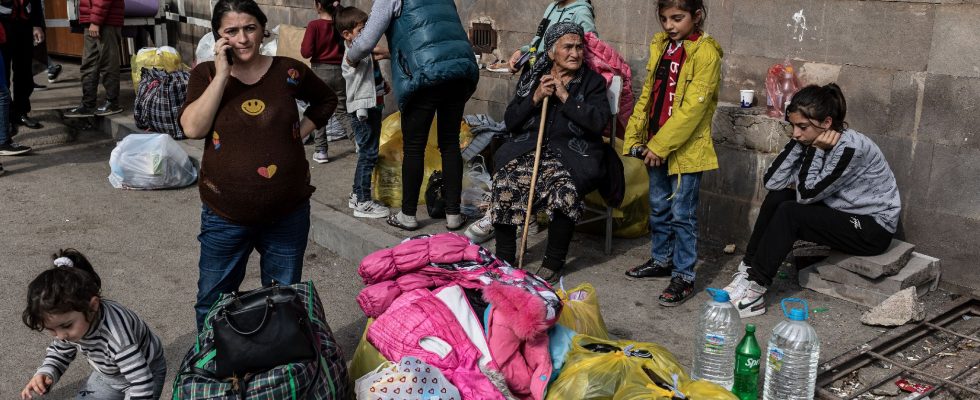The European Parliament described this Thursday, October 5, the situation in Nagorno-Karabakh as “ethnic cleansing”, after the Azerbaijani military intervention on September 19, having caused the exodus of more than 100,000 Armenians in a few days, i.e. almost the entire Armenian population of the enclave. In a text voted by a very large majority, MEPs were in favor of “targeted” sanctions against Baku, which they accuse of violations of human rights and the ceasefire.
Earlier this week, French politicians from all sides also denounced this “ethnic cleansing”, including the presidents of the National Assembly and the Senate Yaël Braun-Pivet and Gérard Larcher. Some elected officials also used the term “genocide”, loaded with meaning in this Caucasian country traumatized by the massacre of its population by the Ottoman Empire more than a century ago.
Not a legal term
What does the notion of ethnic cleansing mean, and what does it imply? It was in 1992 that the term became widespread, used by the UN Security Council regarding the conflict in former Yugoslavia. At the turn of the 1990s, the Socialist Federal Republic of Yugoslavia was torn apart by a series of murderous wars involving ethnic conflicts. The ordeal in the Srebrenica enclave which ended in July 1995 with the massacre of nearly 8,000 Muslim men and boys illustrates the policy of “ethnic cleansing”.
The UN defines it as “a deliberate policy designed by an ethnic or religious group aimed at eliminating, through the use of violence and terror, civilian populations belonging to an ethnic or religious community distinct from certain geographical areas “. Assassinations, arbitrary detentions, confinement in ghettos, rapes, displacements and deportations of civilian populations can be the means used.
Taken to the extreme, “ethnic cleansing” can lead to the total or partial destruction of an ethnic and/or religious group, in other words a genocide, as in Rwanda in 1994. The latter is defined by Article 6 of the Rome Statute of the International Criminal Court as crimes “committed with the intent to destroy, in whole or in part, a national, ethnic, racial or religious group”.
The notion of “ethnic cleansing” does not, strictly speaking, have any legal value from the point of view of the Rome Statute, the founding treaty of the International Criminal Court, which has jurisdiction over war crimes and crimes against humanity. , crimes of genocide or crimes of aggression committed on the territory of its member States or by their nationals. But, depending on the scale and seriousness of “ethnic cleansing”, UN experts estimated that these practices could “constitute crimes against humanity” and “be assimilated to well-defined war crimes”.
Forced displacements
What about the Nagorno-Karabakh region? The accusation is rejected by Azerbaijan, for which “Armenian residents are leaving the region of their own free will” and which calls on them “not to leave their homes”. The experts and refugees interviewed evoke several reasons which pushed them to flee: the injunctions of the separatists, the fear of reprisals which has remained strong since the great war of the 1990s which resulted in 30,000 deaths and the cross-exodus of hundreds of thousands of Azerbaijanis and Armenians. We also remember the heartbreaking memory of the thousands killed during the second war between the two camps, in 2020.
After this lightning military victory for Azerbaijan, MEPs fear that Baku will launch a military operation against Armenia, while troops have already taken up positions in the south of the country near Jermuk. If this were to be the case, the European Parliament said it was in favor of a suspension of all hydrocarbon imports from Azerbaijan, Baku’s bargaining chip.
On Tuesday, Armenia’s Parliament ratified membership of the International Criminal Court, hoping for additional protection against its powerful neighbor Azerbaijan in the event of attempted violations of its national borders. While a crisis summit is being held in Spain this Thursday, in the presence of 50 European leaders but without Azerbaijan and Turkey, Baku has announced that it is ready for talks with Armenia under the mediation of the European Union.
